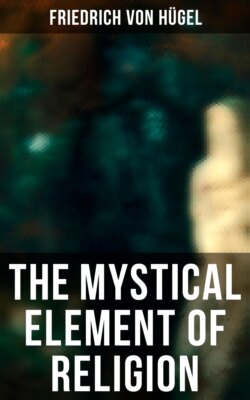Читать книгу The Mystical Element of Religion - Friedrich von Hügel - Страница 60
На сайте Литреса книга снята с продажи.
1. This conception not excessively intellectual.
ОглавлениеDoes not, in the first place, such a view of life appear preposterously intellectual? What of the uneducated, of the toiling millions? What of most women and of all children? Are then all these, the overwhelming majority of mankind, the objects of Christ’s predilection, the very types chosen by Himself of His spirit and of God’s ideal for man, precluded from an essential element of religion? Or are we, at the least, to hold that an ethical and spiritual advantage is necessarily attached, and this too for but a small minority of mankind, to a simply intellectual function and activity? If there was a thing specially antagonistic to Christ and condemned by Him, it was the arrogance of the Schools of His day; if there is a thing apparently absent from Christ’s own life it is all philosophizing: even to suggest its presence seems at once to disfigure and to lower Him. Is then Reasoning, the School, to be declared not only necessary for some and for mankind at large, but necessary, in a sense, for all men and for the religious life itself?
The answer to all this appears not far to seek. The element which we have named the intellectual, is but one of the faculties of every living soul; and hence, in some degree and form, it is present and operative in every one of us. And there is probably no greater difference between these degrees and forms, with regard to this element, than there is between the degrees and forms found in the other two elements of religion. For this intellectual, determinist element would be truly represented by every however simple mental attention to things and their mechanism, their necessary laws and requirements. Hence, the Venerable Anna Maria Taigi, the Roman working-man’s wife, attending to the requirements and rules of good washing and of darning of clothes; St. Jean Batiste de la Salle, the Breton gentleman, studying the psychology of school-children’s minds, and adapting his school system to it; St. Jerome labouring at his minute textual criticism of manuscripts of all kinds; St. Anselm and St. Thomas toiling at the construction of their dialectic systems,—all these, amongst endless other cases, are but illustrations of the omnipresence and endless variety of this element, which is busy with the rules and processes that govern things.
And it is impossible to see why, simply because of their superior intellectual gifts and development, men like Clement of Alexandria and Origen, Cassian and Duns Scotus, Nicolas of Coes and Pascal, Rosmini and Newman, should count as necessarily less near to God and Christ, than others with fewer of such gifts and opportunities. For it is not as though such gifts were considered as ever of themselves constituting any moral or spiritual worth. Nothing can be more certain than that great mental powers can be accompanied by emptiness or depravity of heart. The identical standard is to be applied to these as to all other gifts: they are not to be considered as substitutes, but only as additional material and means for the moral and spiritual life; and it is only inasmuch as they are actually so used, that they can effectively help on sanctity itself. It is only contended here that such gifts do furnish additional means and materials for the devoted will- and grace-moved soul, towards the richest and deepest spiritual life. For the intellectual virtues are no mere empty name: candour, moral courage, intellectual honesty, scrupulous accuracy, chivalrous fairness, endless docility to facts, disinterested collaboration, unconquerable hopefulness and perseverance, manly renunciation of popularity and easy honours, love of bracing labour and strengthening solitude: these and many other cognate qualities bear upon them the impress of God and of His Christ. And yet they all as surely find but a scanty field of development outside of the intellectual life, as they are not the only virtues or class of virtues, and as the other two elements each produce a quite unique group of virtues of their own and require other means and materials for their exercise.
